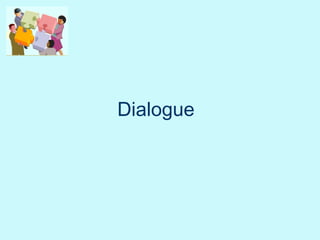
Dialogue
- 1. Dialogue
- 2. DEVELOPMENTAL LEVELS Theory of Developmental Levels (Herb Shepard 1965) Primary Mentality A zero-sum game between individual and group If an individual co-operates, the group gains But the individual loses out Secondary Mentality The co-operative group gains more viewpoints And strengthens each person’s individuality
- 3. CONSENSUS Facilitated workshops usually aim for consensus Consensus is defined as: General agreement Absence of sustained opposition Taking account of all parties’ views Reconciling any conflicting arguments www.bsigroup.com/en/Standards-and-Publications/About-standards/Glossary/ Attempts to gain consensus can degenerate into forcing people to say that they agree
- 4. DIALOGUE IS MORE AMBITIOUS Negotiation aims to arrive at an agreement between parties that differ Collaboration aims to share decision-making Consensus aims to reconcile conflicting views Dialogue aims to find a new understanding, leading to new ways to think and act that, in turn, lead to other new ideas
- 5. WHAT IS DIALOGUE? DIA = through LOGOS = word / meaning / gather together > relationship DIALOGUE = flow of meaning through relationships TQM seeks to solve the problem of errors, not by correcting errors after they occur, but by changing processes so errors don’t occur in first place Dialogue seeks to solve the problem of fragmentation not by rearranging the components of conversation, but by uncovering and changing the underlying structures that cause fragmentation in the first place
- 6. EARLY (first?) USE OF DIALOGUE To improve conversations among physicists David Bohm (1965) advocated: Groups of 20–40 people meet in a circle (enough people to avoid any family dynamic) For several hours each day, over several days No agenda Try to suspend preconceptions and prejudices Look at process, at how thoughts have moved
- 7. EARLY (first?) USE OF DIALOGUE David Bohm describes Dialogue as: 1st person speaks 2nd person hears similar meaning (not the same) As 2nd person replies, 1st person sees a difference between what he meant to say and what 2nd person heard This difference suggests something new As dialogue continues, new content emerges So they are creating something in common, new
- 8. BOHM’S PHILOSOPHY Bohm on Physics Reality involves unbroken wholeness in flowing movement Bohm on Dialogue Thought is a collective enterprise arising from how we discourse Conditions for effective dialogue All participants must "suspend" their assumptions, literally, to hold them "as if suspended before us"; All participants must regard one another as colleagues; There must be a facilitator who holds the context of dialogue
- 9. MEETINGS ARE LONELY PLACES Most of the time, we think alone: We defend our position We look for evidence to prove that we are right and others are wrong We avoid being vulnerable to other opinions We withhold information We feel hurt or betrayed We lose respect for the other side
- 10. HISTORY Cultures that used dialogue survived for a long time: e.g. Native Americans, Ancient Greeks, Maoris So, is dialogue something we already know? or is it something we have forgotten?
- 11. CLAIMS for DIALOGUE When F W de Klerk visited Nelson Mandela in prison, they devised a new context for South Africa John Hume & Jerry Adams talked privately about how to stop violence in N. Ireland In both cases, dogmatists went to great lengths to prevent these conversations. . Isobel thinks the magic here was that the conversations were out of the public eye. A new “mind” emerges, if: Participants believe that maintaining good feelings within the group is more important than holding to their fixed position
- 12. HARGROVE A dialogue is a conversation where: There is a free flow of meaning … and Diverse views & perspectives are encouraged People desire to learn from different colleagues Collaboration is based on inspiring visions It is deeply purposeful, focused on practical accomplishments that are carried out in conversations
- 13. FACTS model
